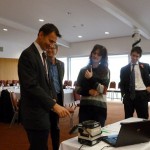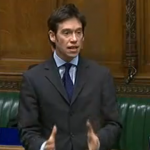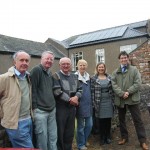Rory speaks out against wedding and funeral car hire legislation

Rory has thrown his weight behind the wedding and funeral car sector, in response to the Law Commission’s unpopular proposals that would see wedding and funeral cars subject to the same legislation for taxis and private hire vehicles, leading to increased licensing, running and compliancy costs, and a level of bureaucracy that could signal the death knell for the business.
Rory joined David and Heather Graham, owners of Longtown-based vintage car company Silver Lady Wedding Car Hire, and drivers from Langwathby-based Cars of Distinction at the Smith’s Hotel in Gretna where he met and chatted with drivers likely to be affected, and helped to highlight the damage that this legislation could cause to small Cumbrian vintage-car businesses.
Rory said: “This is a great tradition that goes back over hundreds of years – where people can cross to Gretna to get married – so the wedding business, and particularly classic cars, is a wonderful part of what gives life and colour to the constituency. In the past wedding cars, like funeral cars, were exempt from taxi legislation and there is a move to change that. I think that would be a great pity, because it would make it very difficult for businesses like these to run. Silver Lady Wedding Car Hire, for example, relies on people who are volunteers, who do it as a hobby, and probably do it for five or ten days in a year. So to put people through the full cost of all the checks, legislation and licensing as though they were a full-time taxi driver is, I think, like taking a sledge hammer to crack a nut. I have written already to the Law Commission and will be writing again to the Chancellor and to the Department of Transport to ask that this sector remains exempt from this legislation.”
Heather Graham of Silver Lady Wedding Car Hire said: “We are delighted with our MP’s support. Currently we are in the consultation stage of the legislation, so it is really important for people to be able to object within this period. The effects on our business would be significant like they would be on most other exclusive wedding car hire businesses. It would be prohibitive and restrictive, and mean not only that we would need a private hire operators licence, but each of our cars would individually have to go through a local authority test which is six times more expensive than the current MOT test. A petition has also been launched on Thursday 26th July 2012 at the World Famous Blacksmiths shop in Gretna Green, for visitors & wedding parties to sign”.
Constituents who would like to express their objections can contact the Law Commission; the consultation closes on the 10th of September. Email to [email protected] or write by post to Public Law Team (Taxi and Private Hire), Law Commission, Steel House, 11 Tothill Street, London SW1H 9LJ














